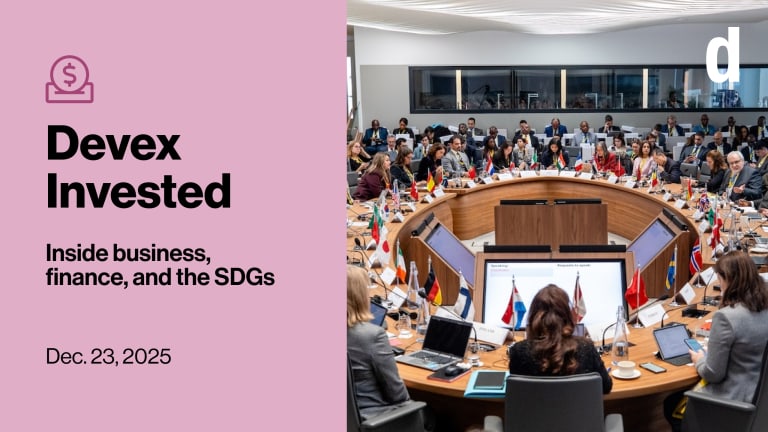
As the European Commission rolls out a new taxonomy to define “sustainable” economic activities inside the European Union, we are wondering: What does this mean for Europe’s development policy around the world? Could the commission use the EU budget to guarantee a development bank against a first loss on a natural gas project in, say, Mozambique?
This is a preview of Devex Invested
Sign up to this weekly newsletter inside business, finance, and the SDGs, in your inbox every Tuesday.
For now, the short answer is: No one knows. We hear the commission’s development department only got involved later on in the process, which is being run through the financial services team.
After one explanation from the commission’s director for external green and digital policy at a recent webinar, we asked a spokesperson for some clarifications. They wrote back:
• By aiming to help Europe become carbon neutral by 2050, the new taxonomy “is not meant as an instrument of development policy.”
• But the EU is working through the International Platform on Sustainable Finance, the G-7 and G-20 groups of nations, and the Financial Stability Board, “exploring ways to operationalise the EU Taxonomy globally in an appropriate and proportionate way.”
• As part of dialogue with partner countries, Brussels is “sharing our experiences and tools such as the EU Taxonomy.“
Still, development banks are wary. Responding to a public consultation earlier this month, the Association of European Development Finance Institutions called for a transition plan — including technical assistance — for European investors in low-income countries.
+ ICYMI: The push for environmental, social, and governance standards
Investing in women
One big number: $15 billion.
That’s the new goal for the 2X Challenge global gender finance initiative. Since its launch in 2018, development finance institutions have mobilized more than $7 billion for gender lens investment, more than doubling an initial goal. Given the rapid pace of commitments, the DFIs are now setting a new target for 2022. More than 200 deals have qualified under the 2X gender financing standards — with the most funding going to Latin America, followed by sub-Saharan Africa, where the volume of deals quadrupled over the past year.
Don’t bank on it
Talk of creating a new European Climate and Sustainable Development Bank has turned out to be just that. Instead, EU states signed off Monday on relatively conservative guidance for European development banks, particularly the European Investment Bank and the mixed-ownership European Bank for Reconstruction and Development.
• EU capitals want the banks to provide greater development impact without additional costs — though some experts say that’s impossible.
• Pierre Heilbronn, a vice president at EBRD, said in a recent interview that the bank has been working together with EIB on climate standards, mutual reliance, and new joint investment vehicles, with more details to come in the fall.
• For our part, we were surprised to see that a consultants’ study on the saga has not been made public on the Council of the EU’s website. We’ve lodged a request for access to documents; the study had a budget of up to €500,000 of taxpayer money, after all.
A musical journey
London calling
We hear EBRD is getting close to announcing a bunch of appointments to its executive committee, including a secretary-general and managing director for corporate strategy, along with replacements for outgoing vice presidents Heilbronn and Fernando Pons.
Your next job?
Eastern and Southern African Trade and Development Bank
Nairobi, Kenya
The new social media
“If fundraisers don’t get on board [with Clubhouse], you are going to be left behind.” Find out why experts think social audio could be the next big thing for fundraising, in our newest report for Pro subscribers.
Investments of interest
• The Joint SDG Fund announced it will provide $30 million to small island developing states for boosting resilience and ending vulnerability. The call for proposals, released Monday, will support catalytic, government-led initiatives in SIDS to promote sustainable growth in countries that are put at particularly risk by climate change.
• G-7 development finance institutions, the International Finance Corp., the African Development Bank’s private sector arm, EBRD, and EIB announced a commitment to invest $80 billion in the private sector in the next five years to support economic recovery and growth in Africa.
Where exactly each institution invests will be up to their individual strategies. It is a big-dollar commitment, though well below the $425 billion in additional financing that the International Monetary Fund estimates sub-Saharan Africa will need by 2025 to respond to the pandemic and reduce poverty.










